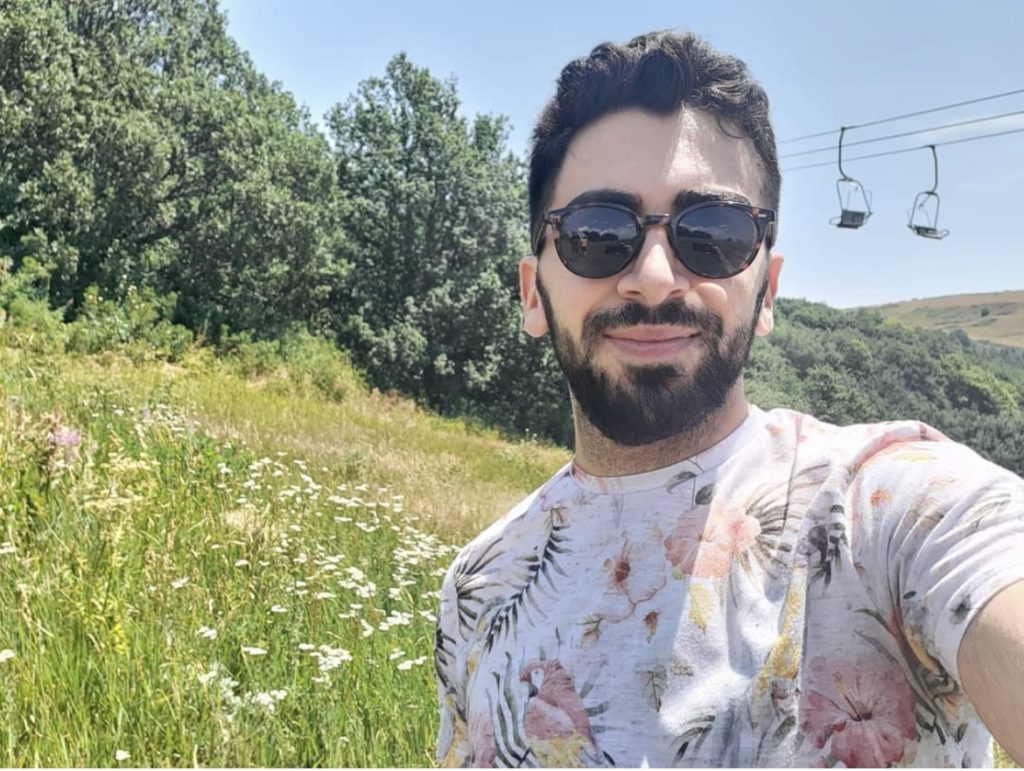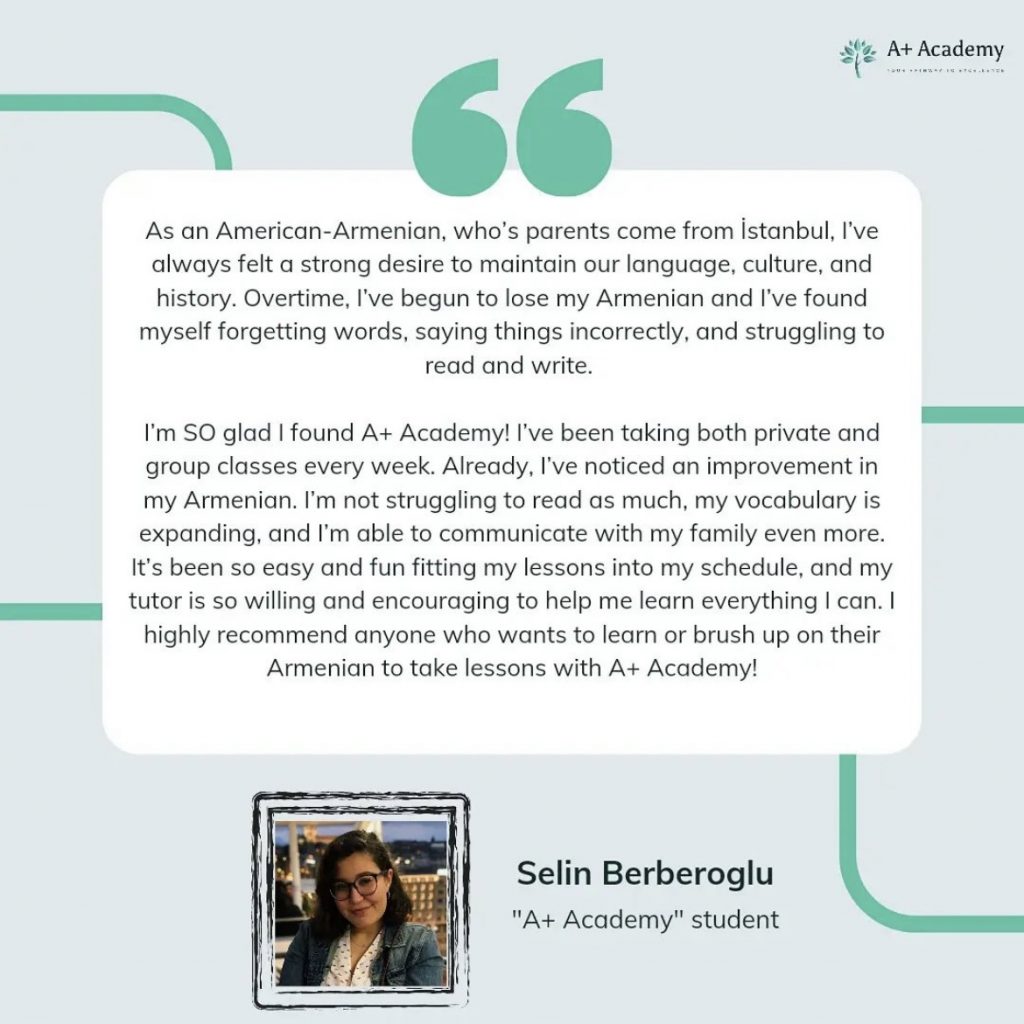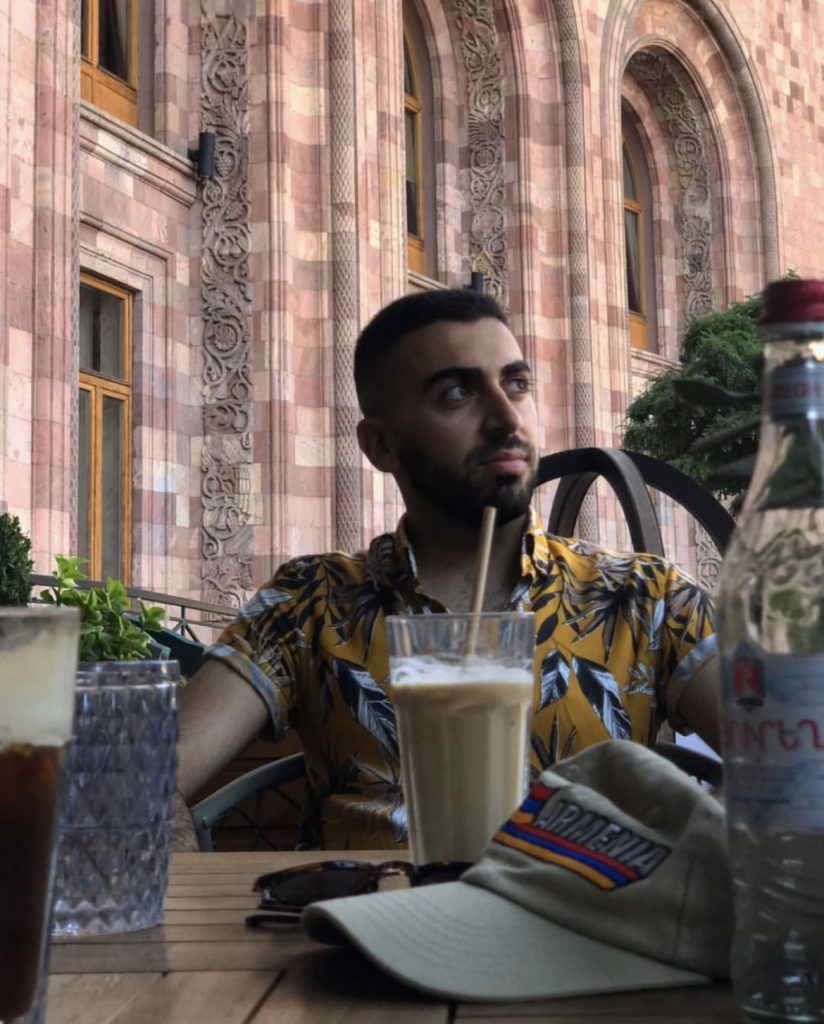Connecting Homeland and Diaspora through Learning, Culture, and Friendship
Written by Kristin Anahit Cass
24 May 2022
“Aghjik, why don’t you speak Armenian?” the tone is always filled with reproach. You’re trying to learn and suddenly your lack of Armenian language skills is a matter of amot (shame).
Narek Shamamyan has a mission to change that. He’s the founder of A+ Academy, an educational platform that promotes community and connection through online learning. A+ launched in August of 2021, but Narek’s ambition to start a school began in his teens when he started making online tutorials for Khan Academy Armenia. But it was his semester abroad that gave him a sense of what it’s like to be isolated in diaspora. He came to understand the feeling of wanting to be connected to Armenians, to feel the Armenian spirit wherever you are.
This interview is done in partnership with Entanik, a chosen family of queer Armenians, other SWANA folks, and allies dedicated to coming together in inclusive unity. You can find their work on Medium and Instagram.

Kristin Anahit Cass: It’s really exciting that the launch of A+ Academy has gone so well. How does the platform work?
Narek Shamamyan: We’re based in Yerevan and the platform provides online classes, at the moment in 12 different subjects. They’re for people of all ages, from everywhere, and we encourage our community to reach beyond their limits to learn new things. Our main audience is diasporan Armenians. Most people are interested in taking Eastern or Western Armenian classes. Our classes are so much more affordable than classes provided in their home countries.
KC: Where are most of your students from?
NS: At the moment, most of our students are from the United States and Canada. We also have some students from Europe, China, and Thailand.
KC: How did you decide to start A+ Academy?
NS: When I was teaching math and coding for five years, I was working mostly with young Armenian students from abroad. While I was teaching them math and coding, their parents would often ask me to teach them some Armenian words during the classes, so that they would be more involved with the culture and the Armenian community. Then I had the idea to provide more subjects that could connect more people to Armenia. I thought I could bring Armenians together from all over the world by connecting them through learning.
Then the war happened [in 2020.] My students’ parents were asking me what they could do, how they could help, how they could support Armenia. I realized they were already supporting the Armenian economy by paying the tutors, and I became more certain than ever that I had to use my interest in education to connect our global community with each other and with Armenia.
KC: Connecting people through learning is a great idea. How do people start working with the platform?
NS: We’re working on our website right now. People can message us through our Twitter, Facebook, and Instagram to request more information on either private or group classes. We’ll schedule an intro call and the student and tutor can discuss the class they’re interested in and schedule a time for classes.
KC: Let’s talk about your popular language classes. How do they work?
NS: All of the classes are personalized, whether private or group, and all of our tutors speak English. If you’re a complete beginner you start with learning the letters and simple words, then forming sentences and learning sentence structure. Most people want to improve their conversational skills, so they work on their speaking and listening skills and then have conversations with the tutor or the group. There’s also interest in grammar and writing. We have a student who’s a poet and would like to be able to write poetry in Armenian. In their class they’re working on reading and analyzing various writings and expanding their vocabulary.
Currently we offer Armenian, Russian, Arabic, Turkish, English, and French language classes. We’re adding Italian, Spanish and chess soon. We also have Armenian history and culture, along with math, coding, chemistry, and biology.
KC: We talked earlier about the judgment and shame that is sometimes directed at diasporans who don’t speak Armenian, discouraging them from learning. I know that one of your goals is to remove barriers like this. How do you make heritage language learners comfortable?

NS: The tutors have been able to strike the right balance between being a good friend and being professional as a teacher. When students sign up for classes, they become part of an Armenian community where they feel accepted and valued. I hope to expand on this and host community gatherings where students can meet other students and tutors, giving them a stronger connection to the global Armenian community. We had a student from Arizona who said she’s been so isolated from Armenians her whole life. At the end of our intro call she said, “Oh, you’re my two new Armenian friends!” She was so excited to be friends with us, and to be a part of an Armenian community.
I really came to understand the need for this kind of community when I did my semester abroad in Wisconsin. There were no other Armenians at the college. At first I wasn’t homesick at all. But after a few months without meeting a single other Armenian, I was feeling it. Finally I met an Armenian woman who presented a lecture about genocide to my class. She too was living in a place with no Armenian community. When we spoke Armenian to each other, we cried because it was such a heartwarming experience. And I thought, Oh these are my people, and I again felt part of something larger than myself. So I think that maybe this sense of isolation is something that diasporans, especially living in a place without a big Armenian community, will relate to. I want to help provide that community and connection for Armenians everywhere.
KC: Many queer Armenians feel shut out of the community. Is A+ Academy queer friendly?
NS: 100%. About half of our students are queer. One of them mentioned that we’re the first queer-friendly Armenian school. We are very queer friendly. We don’t allow any discrimination against anyone.
KC: Did your desire to start an educational platform have anything to do with your own experience as a student?
NS: When I was a student I realized that teachers are not appreciated enough. I recognized that my teachers were working hard and giving their all for us, but still struggling financially. Our governments don’t value them, yet teachers are behind every good doctor, lawyer, scientist—everything. They don’t get the recognition they deserve, so by prioritizing the excellence of teachers living in Armenia who work for A+, I think I can contribute to an appreciation of the importance of teachers to society.
I met up with my middle school math teacher recently. I learned so much about teaching from her. She always found a way to make class fun, sometimes just by taking a few minutes to laugh and joke with us. We were never bored in her classes. My teaching style is similar to hers and it’s working for me with my students.
KC: One thing I know about you is that you’re really friendly and fun. We ended up meeting in person when you messaged Entanik offering to meet us in Yerevan. When we met for drinks, you had another diasporan that you knew through social media with you and it was his last day in Armenia. It was such fun talking with you both that we actually forgot about dinner until we realized we’d had nothing but cocktails since lunch!

NS: During the war, so many Armenians all over the world connected through social media, supporting each other and making friends. Being Armenian was enough for us to trust each other. Now whenever I have the chance to meet up with diasporans in person, I really enjoy it and it becomes my personal goal to convince them to come live in Armenia!
KC: If I were visiting you in Armenia, what would we do?
NS: We’d go to Dilijan for a picnic. It’s one of my favorite places ever. When you suddenly enter Dilijan after the long tunnel through the mountains, it’s like entering another world, especially coming from Yerevan going from the city to this magical forested place in the mountains. It’s so beautiful.
KC: What’s the most Armenian thing about you?
NS: I was eating in a restaurant in L.A. and the server started speaking Armenian to me. I was so surprised and I asked her how she knew I was Armenian. She said, “Look at how hairy you are, the hair on your hands, how could you not be Armenian?” I laughed and I loved that! So, I think that’s the most Armenian thing about me, the way I look.
KC: What are some of the values that seem unique to Armenian culture?
NS: Our very open hospitality, the closeness of families, the politeness and kindness we show to each other and to strangers, our friendships, and the ability to trust strangers as we’re a very small country. It’s my dream to preserve our unique Armenian culture and values, and not simply blend in.
KC: How are friendships in Armenia unique?
NS: With our closest friends, we form a very deep connection. Even if we don’t see each other often, we stay connected through our shared culture, and when we do see each other our bond is still very strong.
KC: What’s a perfect day for you?
NS: My Mom and I have a date every week. We go for walks and do other things. She’s really fun. Every week we go to this Italian ice cream place and try a new flavor, it’s sort of a tradition for us. This week we baked a really amazing cake together. It’s always a perfect day.
KC: So, what’s your superpower?
NS: My superpower is my ability to explain something to anyone so well that they will really understand it. I’m using that power everyday in my work, and I love that.
